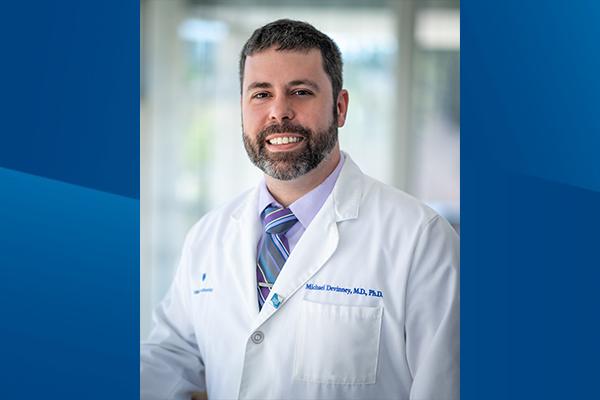
The National Institutes of Health’s National Institute on Aging has awarded Duke Anesthesiology’s Michael Devinney, MD, PhD, a five-year $894,431 K23 grant for his project titled, “The Role of Cerebrospinal Fluid Complement Activation in Delirium and Post-Intensive Care Unit Long-Term Cognitive Impairment.”
Delirium is a syndrome of disrupted attention and consciousness that occurs in approximately 50% of the more than five million intensive care unit (ICU) patients in the United States each year. Delirium is also associated with increased risk for long-term cognitive impairment and Alzheimer’s disease and related dementias. There are no FDA-approved drugs to prevent delirium and post-ICU long-term cognitive impairment, due to a major gap in our understanding of the underlying mechanisms of these disorders.
One possible mechanism that may underpin delirium (and subsequent post-ICU long-term cognitive impairment) is neuroinflammation. Surgical trauma and critical illness induce systemic complement activation and blood-brain barrier dysfunction, which could cause activated complement factors to enter the brain. These activated complement proteins then can cause synaptic tagging for phagocytosis, which can disrupt the neural connectivity necessary for human cognition. Complement-dependent synapse loss leads to memory deficits in mouse Alzheimer’s disease models, and patients with Alzheimer’s disease have increased cerebrospinal fluid (CSF) C3 levels. However, few, if any studies have investigated the role of CSF complement activation in delirium and post-ICU long-term cognitive impairment.
Using immunoassays and unbiased proteomics of cerebrospinal fluid obtained from older surgical and critically ill patients, Devinney’s study aims to test whether increased levels of activated complement proteins, a set of powerful inflammatory mediators, are associated with 1) postoperative delirium, 2) intensive care unit delirium, and 3) post-ICU long-term cognitive impairment. To do so, he will leverage a unique perioperative CSF biorepository and recruit a prospective cohort of 120 older ICU patients that will undergo CSF sampling, delirium assessments, and six-month post-discharge cognitive testing and dementia assessments.
“I am honored to be selected for this K23 award, which enables me to advance my work on the underlying mechanisms of delirium and its sequelae, such as post-ICU cognitive impairment and Alzheimer’s disease and related dementias,” says Devinney, assistant professor of anesthesiology. “This work will also advance my training in ICU clinical research, Alzheimer’s disease pathology, and post-ICU Alzheimer’s disease and related dementias assessments, which will position me to conduct subsequent larger studies in these areas as a critical care physician-scientist. Importantly, this work would not be possible without the support of my department, mentors, and colleagues.”
